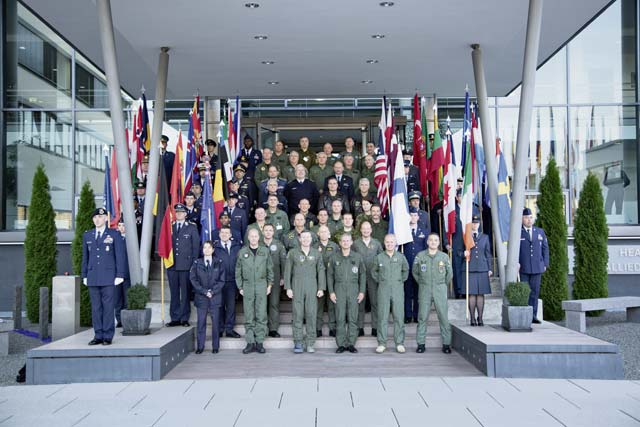
Allied Air Force chiefs and senior enlisted leaders from 24 NATO nations pose for a photo during the second NATO Air Chiefs’ Symposium 2017. The event took place Oct. 16 and 17 at Allied Air Command on Ramstein Air Base. — Photo by OR-8 Sébastien Raffin
Allied Air Force chiefs and senior enlisted leaders from 24 NATO nations convened Oct. 16 to 17 at Allied Air Command on Ramstein Air Base for the second NATO Air Chiefs’ symposium of 2017.
Chaired by the commander of Allied Air Command, Gen. Tod D. Wolters, the semi-annual forum was held to discuss joint and air domain issues. The event also brought together the Supreme Allied Commander Transformation, General Denis Mercier and air chiefs from five partner nations. Additionally, for the first time, the air chief from NATO’s 29th member, Montenegro, took part in the two-day symposium.
To provide context to the discussions, the air chiefs met on Oct. 16 to attend informational multi-media presentations, a NATO Allied Air Command mission brief, and tours of the operations and situation centers as well as a NATO E-3A AWACS aircraft. In opening the symposium, Wolters welcomed the air chiefs and senior enlisted leaders and presented his perspectives on the current security environment and NATO’s strategic shift from assurance to deterrence.
“Air and space power remains one of NATO’s asymmetric advantages, and our unmatched responsiveness and flexibility are available 365, 24/7 to counter any emerging threats to the alliance” Wolters said. “We are leading agents of deterrence and defense; this is a very powerful position that promotes peace among our continents.”
After a strategic context update and a ‘Tour d’horizon’ delivered by Mercier, discussions included: “Current Environment,” “Adapting For the Changing Environment” and “Focus on Future Capabilities.” Topics covered air contributions to enhanced forward presence, the counter Islamic State of Iraq and the Levant mission and a discussion of modern aircraft integration in NATO. Leading the integration of existing and evolutionary fifth-generation platforms will expand NATO’s ability to exploit and dominate the air domain.
Wolters stressed the importance of the discussions generated by the NATO Air Chiefs’ Symposium.
“The discussions we share daily and then collectively within this forum ensure that together our commitment will allow us to continue to successfully execute our mission on behalf of our great alliance,” Wolters said.







